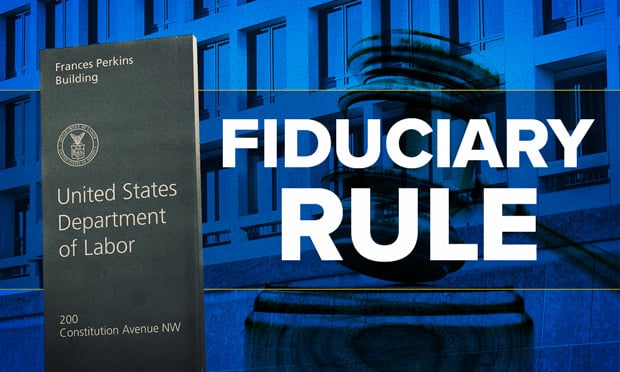The Department of Labor’s plan to revamp the definition offiduciary under the Employee Retirement Income Security Act islikely to face yet another legislative hurdle.
|Industry trade groups are working on a bill that would“legislate a best-interest standard,” Steve Saxon, chairman ofGroom Law Group, told reporters Monday after his comments at theInsured Retirement Institute’s Government Legal & RegulatoryConference in Washington.
|Read: Opponents say DOL fiduciary ruleunworkable
|Barbara Roper, director of investor protection at the ConsumerFederation of America, told ThinkAdvisor in a Monday email thattrade groups are, indeed, working on best-interest legislation, andthat it remains unclear if such a bill will be based on bestinterest standards that were put forth recently by the SecuritiesIndustry and Financial Markets Association and the FinancialServices Roundtable, “or something entirely different.”
|Read: FINRA chief says DOL proposal not the wayforward
|What can be expected, however, Roper argues, is that suchlegislation — expected to be introduced soon — “would give lipservice to best interest without doing anything to rein in commonindustry practices that encourage advisors to act against theircustomers’ interests. That’s something [the SIFMA and FSR] proposals seem to havein common.”
|SIFMA’s “uniform best-interests-of-the-customer legal standardfor broker-dealers” would apply to all retail brokerage accounts,and seeks to correct the potentially conflicting fiduciary rules tobe issued by DOL and the Securities and Exchange Commission.
|Indeed, former SEC Commissioner Troy Paredes noted at the IRIevent that he’d like to see the SEC become the agency that “has thelead” on a fiduciary rulemaking.
|Lawmakers, too, will press ahead during the upcoming Octoberappropriations process to defund DOL’s plan, Saxon said.
||Both the House and Senate appropriations committees haverecently passed bills to prohibit DOL from using any of its fundsto finalize, implement or enforce its fiduciary rulemaking.
|Rep. Ann Wagner’s bill, H.R. 2374, the Retail Investor Protection Act,which would require the DOL to wait to repropose its rule until theSecurities and Exchange Commission issues its own fiduciaryrulemaking, “will continue to be supported,” said Saxon, who hasbeen critical of DOL’s redraft.
|Of course, these bills face a “huge hurdle” in overcoming apresidential veto, Saxon conceded. “The White House is in supportof the general direction that the DOL is going” with its fiduciaryredraft.
|Labor Secretary Thomas Perez noted at a recent Brookings event that the fiduciaryredraft was among the top priorities for DOL in the remainder ofthe presidential term to “help strengthen and grow the middleclass.”
|Read: Brookings paper calls for radical retirementoverhaul
|Calling the current redraft “unworkable,” Juli McNeely,president of the National Association of Insurance and FinancialAdvisors, said in an email message that while NAIFA has haddiscussions with DOL officials about revisions to ensure the rule“does not harm middle-market investors and put undue restrictionsor burdens on advisors,” NAIFA and its “industry partners have alsoencouraged Congress to look at the issue.”
|Among what McNeely said are “several legislative options,” NAIFAhopes for legislation that would “protect the best interests ofclients without imposing the burdens and confusion that the DOLrule would create.”
|But Saxon didn’t hold back on airing his criticisms of DOL’sfiduciary plan at the IRI event, calling the redraft an“Erisafication” of IRAs. “Labor does not have jurisdiction of IRAsunder Title 1 of ERISA,” he said.
|Also, as currently drafted, DOL’s rule, with its “broaddefinition of fiduciary that covers all routine sales activities …is funneling everything toward” the rule’s best interest contractexemption, “at least as far as IRAs are concerned.”
|But as drafted, the disclosure requirements under the BICE are“not workable,” Saxon said.
|Perez stated at the Brookings event that the comments DOL isreceiving on the redraft are helping to “sharpen” its thinking onhow to make changes to the plan’s prohibited transactionexemptions, like the point of sale disclosure requirements underBICE.
|The comment period ends July 21, and then DOL will hold hearingson the redraft the week of Aug. 10. Saxon said that while heappreciates DOL taking industry feedback, DOL should give theindustry some idea “where its redraft is headed” before the Augusthearings.
|Complete your profile to continue reading and get FREE access to BenefitsPRO, part of your ALM digital membership.
Your access to unlimited BenefitsPRO content isn’t changing.
Once you are an ALM digital member, you’ll receive:
- Critical BenefitsPRO information including cutting edge post-reform success strategies, access to educational webcasts and videos, resources from industry leaders, and informative Newsletters.
- Exclusive discounts on ALM, BenefitsPRO magazine and BenefitsPRO.com events
- Access to other award-winning ALM websites including ThinkAdvisor.com and Law.com
Already have an account? Sign In
© 2024 ALM Global, LLC, All Rights Reserved. Request academic re-use from www.copyright.com. All other uses, submit a request to [email protected]. For more information visit Asset & Logo Licensing.








